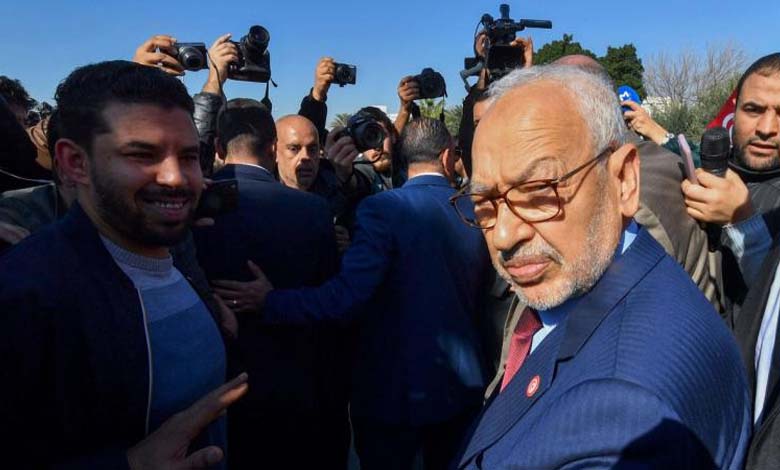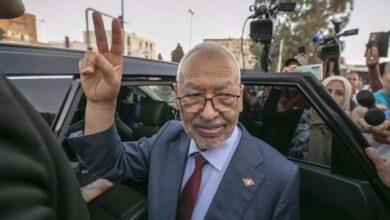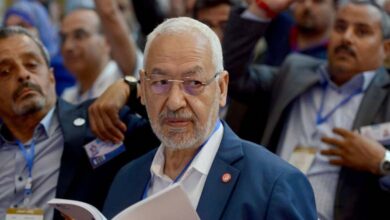Conspiracy Deepens the Wounds of Tunisia’s Muslim Brotherhood: Leaders in Prison and Disillusioned Base

New judicial rulings against Tunisia’s Muslim Brotherhood add another chapter to a trajectory of decline, which no amount of misinformation or political maneuvering has managed to reverse.
-
“The Secret Apparatus” of Tunisia’s Brotherhood: A “Black Box” from Darkness to Light
-
Tunisia’s Brotherhood Announces the ‘Buzz’: ‘Blue Flies’ Swarm over the ‘Rumor Dumps’
A Tunisian court has sentenced around 40 defendants, including prominent Brotherhood figures, to prison terms ranging from 13 to 66 years for “conspiring against state security,” according to official local media.
The First Assistant to the Public Prosecutor at the Anti-Terrorism Judicial Division stated that the charges include “conspiracy against internal and external state security” and “forming and joining a terrorist organization related to terrorist crimes,” without offering further detail.
-
Tunisia Thwarts the Muslim Brotherhood’s Plans in International Justice
-
A TV Report in Tunisia Keeps the Muslim Brotherhood in a “State of Emergency”
Case Background
The case dates back to February 2023, when Tunisian authorities arrested a group of high-profile political figures, including Khayam Turki (Democratic Socialist Party Ettakatol), Abdelhamid Jelassi, a senior Brotherhood member, former Justice Minister and Ennahdha VP Noureddine Bhiri, businessman Kamel Latif, former national security chief Sami Hichri, and businessman Fawzi Fkih.
Investigations revealed that the accused allegedly attempted to overthrow the government on January 27, 2023, by exploiting social unrest and inciting nighttime chaos, with help from insiders at the presidential palace.
-
The Tunisian Brotherhood and the Blood of Brahmi… “The Wolf’s Cloak” Does Not Absolve the Sin
-
Reform without the Muslim Brotherhood: A Tunisian Politician Outlines the Path to Unity
Tunisian security and intelligence services foiled the plot by monitoring the suspects’ calls, communications, and movements. Khayam Turki, reportedly chosen by the Brotherhood to succeed President Kaïs Saïed, acted as the key liaison among the conspirators.
Meetings took place at Turki’s home in Sidi Bou Said, attended by Ennahdha leaders, diplomats, and businessmen including the notorious Kamel Latif, dubbed “the master of plots.”
Politicians, media figures, and even diplomats were implicated. Recorded calls showed links to palace insiders in Carthage aiming to “topple the regime,” under the guise of protesting inflation and food shortages.
-
The “Black Room” Engulfs Tunisia’s Muslim Brotherhood… Judicial Decision against the “Leader” and Key Figures
-
Tunisian President Attacks the Muslim Brotherhood: “Their Illusions Will Never Become Reality”
Dark Judicial Record
This is not the Brotherhood’s only judicial burden in Tunisia. The group also faces accusations of sending hundreds of youth to conflict zones since 2011 and of being involved in political assassinations via its armed wing.
In early February, Tunisian courts sentenced several Brotherhood leaders, including longtime figurehead Rached Ghannouchi, to 22 years in the “Instalingo” espionage case.
-
The Tunisian Muslim Brotherhood and the Assassination of Belaïd… A Fragmented Narrative
-
Tunisia in 2025… Year of « Security Vigilance » and Resolution against the Muslim Brotherhood
His son-in-law Rafik Abdessalem received 34 years, his daughter Soumaya 25 years, and his son Moaz 35 years. Other key figures at Instalingo, a digital media company, were also convicted: Haitham Khouili (28 years), Salem Khouili (54 years), and Yahya Khouili (18 years).
Said Ferjani, a senior Ennahdha official, received 13 years; former intelligence chief Lazhar Loungou, 15 years; journalist Sheherazade Akacha, 27 years; and several bloggers and reporters were also sentenced. The court ordered the confiscation of their assets.
Instalingo is accused of manipulating public opinion and undermining national security on behalf of Ennahdha.
-
How Kais Saied Ended the Control of the “Muslim Brotherhood” Over Tunisia and Its Institutions: A Report Explains
-
Tunisia’s Brotherhood Still Trying to Escalate the Situation… What Have They Done?
What Remains?
Most of Tunisia’s Brotherhood leadership is now imprisoned. The group’s grassroots base is largely demoralized. Attempts to reclaim political relevance seem increasingly desperate.
Following the February verdicts, including Ghannouchi’s conviction, silence prevailed from top to bottom—signaling a movement that had risen during the 2011 revolution but is now politically defunct.
Disillusionment has spread among its remaining followers, who now see the movement as tainted by corruption and extremism.
According to observers, Ennahdha has lost nearly all public support, with only a few remaining leaders like Imed Khemiri, Riadh Chaibi, and Belkacem Hassan still active. The rest are in prison for crimes committed during their time in power.
-
Tunisia Ends the Era of the Muslim Brotherhood: Kais Saied Wins Presidential Election in the First Round
-
Tunisian Muslim Brotherhood Leader Sentenced to Three Years in Prison
Political analyst Abdelkarim Mahmoudi stated that “Ennahdha is banned from direct public activity and its headquarters are sealed by official order. What remains of its leadership only appears online or at small events organized by the so-called ‘Salvation Front’.”
He added, “Most senior leaders—including Ghannouchi, his deputies Bhiri and Larayedh, Secretary-General Ajmi Lourimi, and many members of the Shura Council—are in prison, facing sentences that could reach decades or life imprisonment.”
Legal expert Ziad Kassmi further noted that such convictions could legally lead to the dissolution of Ennahdha, should it be proven that the acts committed were not isolated but systemic within the party.












